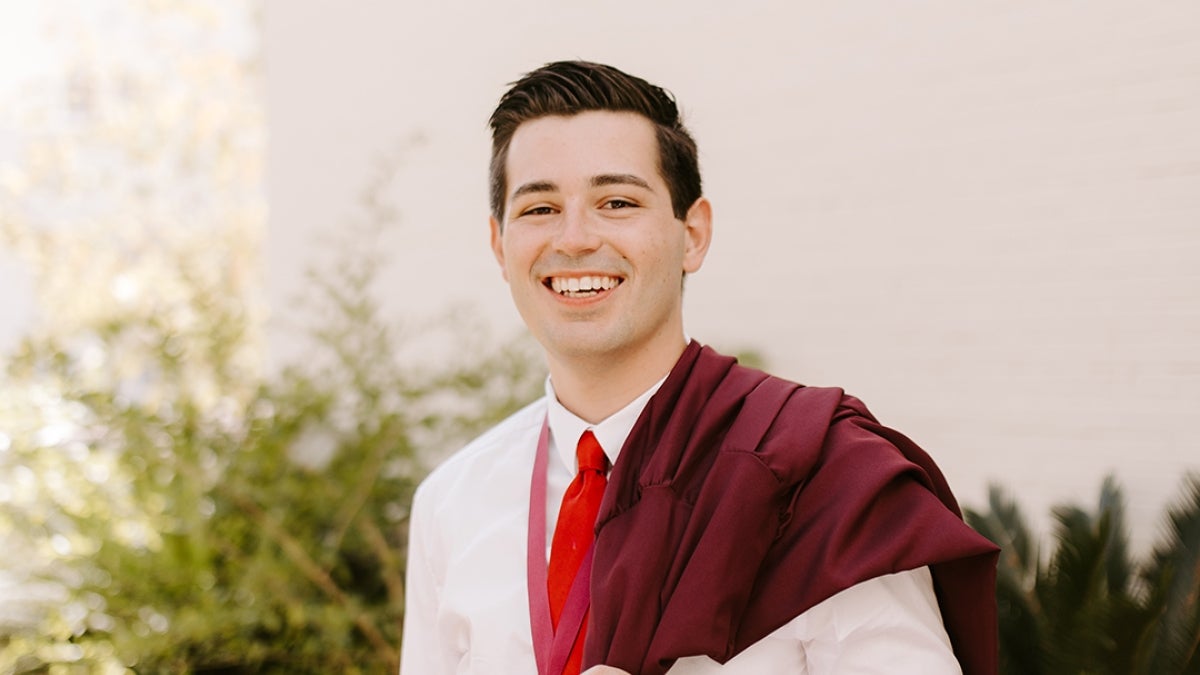ASU grad attributes success to scholarship funding

Photo courtesy Alexander Almeida
Editor's note: This story is part of a series of profiles of notable spring 2022 graduates.
Alexander Almeida will graduate summa cum laude this spring from Barrett, The Honors College at Arizona State University with degrees in economics and mathematics. As an outstanding member of the Sun Devil community, he has had many opportunities to learn, grow and serve those in need.
During his time at ASU, he studied abroad in India and Argentina, and interned at the Federal Reserve doing economic research. He helped direct an environmentally focused portfolio of over $1 million for ASU Enterprise Partners and worked with the Gammage Scholars to help families in the Phoenix Valley succeed.
For these reasons and others, Almeida was selected as the spring 2022 Dean’s Medalist for the Department of Economics at The College of Liberal Arts and Sciences.
But Almeida doesn’t take his Sun Devil experience for granted. He credits support from donors in helping fund his educational journey.
“The reason that I was able to pursue my degree was the incredible generosity of the sponsors of the Business School Scholarship, Earl and Ellen Davis Scholarship, Gammage Scholarship, IGNITE Fellowship, National Hispanic Scholarship, School of Civic and Economic Thought and Leadership's Founders' Scholarship, Spanish Summer Program Scholarship, as well as the Jonathan and Helen Wexler Family, along with the support of my friends and family,” he said.
Now, Almeida is prepared to utilize his skills to solve societal problems. He plans to do economic research for the next two years as a research fellow at Stanford University's Graduate School of Business, where he hopes to earn a graduate degree in economics to continue studying the role that financial markets play in human and environmental betterment.
Learn more about Almeida’s Sun Devil story.
Question: What was your “aha” moment when you realized you wanted to study the field you majored in?
A: After my first year at ASU, I underwent an unexpected surgery to remove a bone cyst from my spine as I was taking summer classes. On the day of the surgery, I even turned in a problem set for my linear algebra class.
I was simultaneously confronted with my mortality and choices about my major, my career and the legacy that I wanted to leave. I decided to study mathematics and economics to try to make the world a better place.
Q: Did you encounter any challenges? If so, how have you overcome them?
A: I came to ASU from Illinois knowing only a few people, so adapting to the environment here was a fun challenge. Through dorming at Barrett, clubs and classes, I have made many lifelong friends and relationships. I also convinced my sister, now a sophomore, to join me at ASU.
Q: Which professor taught you the most important lesson while at ASU?
A: It is really challenging to narrow down the breadth of guidance that I have received into a singular moment. I do want to recognize that my interests in research have been nurtured by gifted academics Drs. Ross Emmett, Chad Stecher, Michael Hanemann and Christos Makridis.
In economics, I am indebted to Drs. Edward Schlee, Edward Prescott, Bart Hobijn and Rajnish Mehra for their mentorship in pursuing a career in the field, and from the mathematics faculty, I have received valuable guidance from Dr. Donald Jones.
The leadership at the School of Civic and Economic Thought and Leadership as well the administrators at Barrett have also contributed to my success.
Q: What's something that you've learned during your time at ASU – in the classroom or otherwise – that surprised you or changed your perspective?
A: I traveled to India to study abroad with the School of Civic and Economic Thought and Leadership. My cohort worked with a group of rural night schools affiliated with the Barefoot College in Tilonia, Rajasthan. I had the chance to talk with some of the students at a night school, and when I asked the students about their aspirations, they responded that all they wanted was to attend school all day. It changed my perspective on education and empowered me to fight for students here in Maricopa County that face systemic barriers to their success.
I had the privilege of teaching children who had sought asylum from countries across the world with RISE Tutoring, and when the pandemic compounded barriers for disadvantaged students in Phoenix, I helped to organize with the Gammage Scholars, a community-based campaign to empower families in getting digitally connected.
More Science and technology

Lucy's lasting legacy: Donald Johanson reflects on the discovery of a lifetime
Fifty years ago, in the dusty hills of Hadar, Ethiopia, a young paleoanthropologist, Donald Johanson, discovered what would…

ASU and Deca Technologies selected to lead $100M SHIELD USA project to strengthen U.S. semiconductor packaging capabilities
The National Institute of Standards and Technology — part of the U.S. Department of Commerce — announced today that it plans to…

From food crops to cancer clinics: Lessons in extermination resistance
Just as crop-devouring insects evolve to resist pesticides, cancer cells can increase their lethality by developing resistance to…